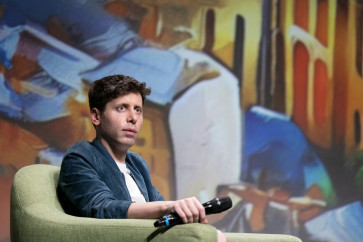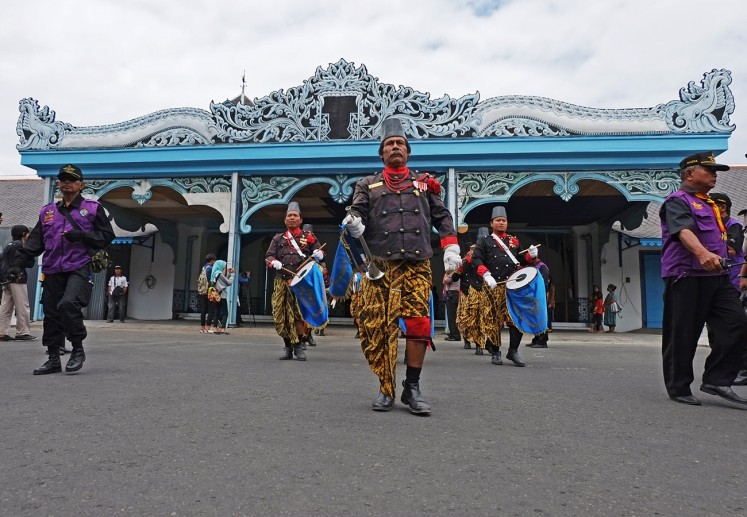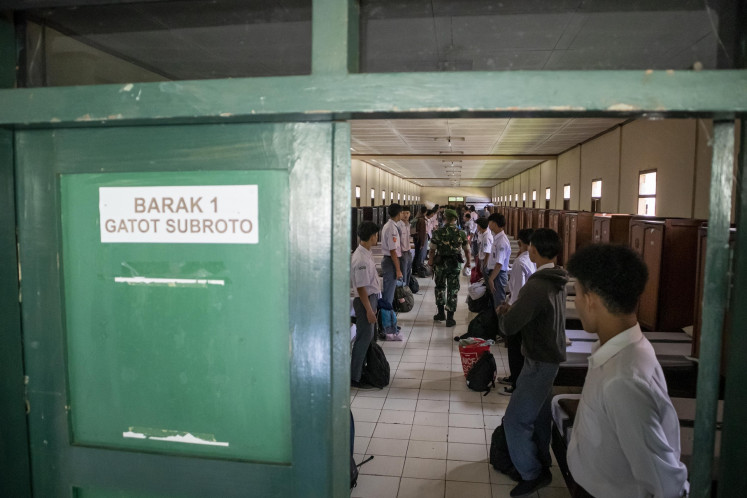Goethe Institute celebrates its 50th
At a glance, it seemed like the Goethe Institute had turned into the famous Gaul village, home of the two well-known French comic characters Obelix and Asterix, and a place where villagers gather to celebrate a victory
Change text size
Gift Premium Articles
to Anyone

A
t a glance, it seemed like the Goethe Institute had turned into the famous Gaul village, home of the two well-known French comic characters Obelix and Asterix, and a place where villagers gather to celebrate a victory.
But the festivities were real. Joy was witnessed all over, as people were gathered to celebrate the German center’s 50th anniversary. The Goethe Institute organized a one-day open house, inviting everyone, literally, from those who spend countless hours learning German there to passersby who just wanted to seize the day with a plate of chicken satay or German sausages.
Dozens of people sat around the tables in the building’s front yard, chatting and waiting for their dishes to be served. There was a local chicken satay vendor right near the entrance gate. In the opposition direction, people lined up at the stall serving famous German dishes.
Inside, various activities were available for people of many ages. A comics workshop for children between 7 and 15, for example, was taking place in one of the rooms. German class simulations had also been organized to give people an idea how students learn there.
There were also movies on offer, and almost simultaneously presentations on German scholarships.
But the most people were gathered to watch the parade of artists performing on two different stages.
Names like the Batavia Madrigal Singers charmed the audience by performing “Gloria in Excelsis Deo” in an Indonesian style, and the Bandung-based Salamander Big Band brought various genres from blues to swing together to create a night to remember from the celebrations.
The announcement of door prizes apparently managed to “nail” people in their seats for quite awhile, waiting for the luck of the draw.
Among the guests that evening was Ika Lubis, a student at the Jakarta State University majoring in German, who acknowledged that she had reaped huge benefits from the Goethe Institute and expected that the “friendship” would last.
“I’ve been routinely coming to this place, visiting the library and meeting friends old and new,” Ika told The Jakarta Post.
One of Goethe’s major roles is providing German language courses. Right now, for instance, as many as 5,500 students are registered at the institute and 16,300 others are registered at dozens of partnering schools all over the continent.
However, in the larger picture, the institute has the mission to initiate harmonious relationships through art and culture between Germany and other countries around the globe. Through its 150 offices in 93 countries over the world, the Goethe Institute holds the responsibility to present Germany to the world.
Avip Priatna, one of Indonesia’s noted conductors, acknowledged that his “interaction” with Goethe had granted him insight. He then mentioned that in 2010, he was invited to perform in Germany and received assistance from the institute.
“Above all, it’s the experience, the chance to learn something new, and to adopt good values that eventually improve us, [that] is the most important thing,” he said.
Franz Xaver Augustin, Goethe Institute’s regional director for Southeast Asia, Australia and New Zealand, said the institute has accomplished much in its 50-year journey interacting with the Indonesian people.
When asked why they chose art and culture as the way to foster relationships, he said that the path had been selected solely because they believe that better appreciation of art and culture can improve peoples’ intellectual capacities, which enables people to produce better quality art and cultural pieces themselves and, in the larger sense, their quality of living.
He said the institute has worked tirelessly to organize dozens of workshops tailored for musicians, from jazz to classical; dancers, from traditional to modern; filmmakers; and painters from all genres over the years.
However, he recalled it wasn’t always an easy road for the Goethe Institute when interacting with its Indonesian counterparts. He then mentioned the long yet ineffective bureaucracy that could be quite a challenge.
Augustin said he had to deal with this bureaucracy when the institute wanted to restore the paintings of Raden Saleh, one of Indonesia’s most respected painters.
“We wanted to ask the people to honor these great works by cherishing them with the public and to be able to do that in a long period, of course proper restoration on a regular basis is required. Up to this point, I don’t think that most people are familiar with this idea and that’s why we must work hard on that,” he said.
He mentioned a few Indonesian tycoons who are true art lovers like Hasyim Djodjohadikusumo and
Dr. Oei Hong Djien, who has galleries in Magelang, who both wanted to work hand in hand with Goethe and who had dedicated a great deal of time and resources to preserving the country’s priceless artistic legacy.
When asked what should be done in the future, Franz said that there were two things that he wants to do. The first is strengthening relationships with the media so that more people can become aware of what the institute has done and what it will do in the future. The second is to renovate the entire compound.
“Next year will likely be my last year here and therefore I must compete with time to start working on those two priorities. I will likely not be able to see the result of the renovation but one thing for sure is that the renovation process will be done under my watch,” he said.









